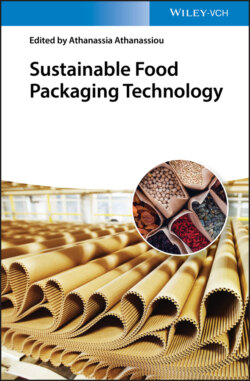Читать книгу Sustainable Food Packaging Technology - Группа авторов - Страница 19
1.3.4 Polybutylene Succinate
ОглавлениеPolybutylene succinate (PBS) is a biodegradable and compostable aliphatic polyester produced by polycondensation of succinic acid and 1,4‐butanediol. PBS was exclusively derived from petroleum‐based monomers, but since more recently the monomers can also be obtained by the bacterial fermentation route to produce fully bio‐based polybutylene succinate (bio‐PBS) [29, 55]. So far succinic acid has been mainly produced by electrochemical synthesis due to the high yield, low cost, high purity of the final product, and very low or no waste formation [56]. However, the production of succinic acid by bacterial fermentation uses renewable resources and consumes less energy compared to chemical process. For this reason, companies such as Corbion (Geleen, the Netherlands) and BASF are working on the scaling up of an economically feasible bio‐based succinate production process, despite the fact that these processes have traditionally suffered from poor productivity and high downstream processing costs. Other examples are the development of a biomass‐derived succinic acid production by Mitsubishi Chemical (Tokyo, Japan) in collaboration with Ajinomoto (Tokyo, Japan) to commercialize bio‐PBS or the development of a commercially feasible fermentation process for the production of succinic acid, 1,4‐butanediol, and the subsequent production of PBS by DSM (Heerlen, the Netherlands) and Roquette (Lestrem, France). Myriant (Quincy, USA) and Bioamber (Plymouth, USA) have also developed a fermentation technology to produce the monomers [57, 58]. Thus, in 2015, the annual production capacity of bio‐based succinic acid reached 200 000 tons [59]. In the case of 1,4‐butanediol, conventional production processes use fossil fuel feedstocks, such as acetylene and formaldehyde. Nevertheless, the bio‐based process to obtain the diol involves the use of glucose from renewable resources to produce succinic acid followed by a chemical reduction to produce butanediol [29]. PBS with excellent mechanical properties and processing capabilities can be then produced from the renewable monomers by transesterification, direct polymerization, and condensation polymerization reactions followed by chain extension and lipase‐catalyzed synthesis.
PBS is a semicrystalline aliphatic polyester with a good melt processability and balanced mechanical properties, closely comparable to those of PP. It is tougher than PLA and it shows similar thermal behavior than LDPE and a melting point lower than that of PLA [29, 60]. Its thermal and mechanical properties highly depend on the crystal structure and the degree of crystallinity [61]. The Tg and Tm are approximately −32 and 115 °C, respectively. In terms of mechanical properties, PBS has a good tensile and impact strength with moderate rigidity and hardness [29]. PBS has a wide processing window, which makes the resin suitable for extrusion, injection molding, thermoforming, fiber spinning, and film blowing. PBS has been employed as film, in foaming, and in food packaging containers [60]. However, the relatively poor mechanical flexibility of PBS limits the applications of 100% PBS‐based products. This issue can be overcome by blending PBS with other biopolymers and fillers to improve the mechanical properties to suit the required application and biodegradation rate [62–65]. The development of PBS copolymers can also lead to biopolymers with a decreased degree of crystallinity, depressed heat distortion temperature, and improved elongation [56, 66]. Copolymerization is achieved by adding a third monomer such as sebacic acid, adipic acid, terephthalic acid, succinic acid with substituted side groups, 1,3‐propanediol, and other substituted glycols, which can be also produced from renewable resources. Poly(butylene succinate‐co‐terephthalate) (PBST) and poly(butylene succinate‐co‐adipate) (PBSA) are the most employed copolymers, PBSA being the most common for flexible packaging applications. Additionally, the flexibility of the PBS backbone and the presence of readily hydrolyzable ester bonds, which are prone to catalytic degradation by microorganisms or enzymes, promote rapid degradation process of the PBS copolyesters [67]. Some studies have evaluated the biodegradability of biodegradable polymers in the mature compost soil and found that the biodegradability of PBS was slower than that of PBSA in compost soil [68]. However, the results of enzymatic hydrolysis as well as environmental degradation of PBS are highly dependent on the environment, the composition of the PBS grade, and its compound [55].
